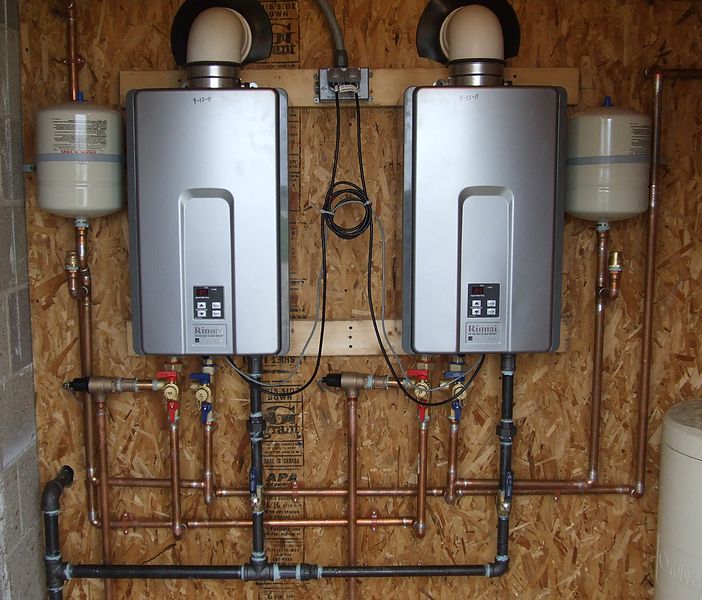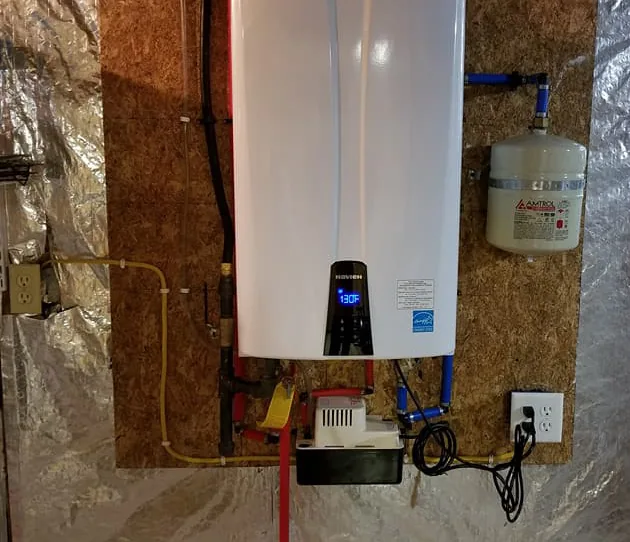How Continuous-Flow Water Heaters Provide Unmatched Benefits
How Continuous-Flow Water Heaters Provide Unmatched Benefits
Blog Article
The writer is making a few good pointers relating to Pros and Cons of Tankless Water Heater overall in this article further down.

In a globe where ease and efficiency preponderate, it's not a surprise that homeowners are regularly on the lookout for smarter means to handle their home's energy intake and comfort. One innovation that has actually gradually acquired popularity is the tankless hot water heater. However just what makes these systems attract attention from the standard tank-based models a lot of us grew up with? Let's dive in and discover the advantages of tankless water heaters, assisting you determine if it's time to make the switch in your home.
Intro
Photo this: you step into the shower after a lengthy day, expecting a relaxing cascade of warm water, only to be welcomed by icy droplets since the last person used all of it up. Audio acquainted? Typical hot water heater keep a fixed amount of hot water, implying you're at the grace of that tank's supply. Tankless systems, on the other hand, warmth water as needed. Say goodbye to running out mid-shower, no more wrestling with timetables simply to make certain hot water is readily available.
Recognizing Tankless Water Heaters
What Are Tankless Hot Water Heater?
Tankless hot water heater, sometimes called on-demand or instantaneous water heaters, supply hot water just as it's needed. Rather than storing gallons of pre-heated water, these systems kick right into activity the minute you turn on the faucet. Water travels through a heat exchanger, heating up in real-time, indicating you obtain an uninterrupted circulation of hot water without the requirement for a huge storage tank sitting lazily by.
Exactly how Do They Vary from Typical Systems?
Conventional heating systems hold a tank of warm water, utilizing energy to keep that tank at a consistent temperature level. Tankless devices remove the standing supply, minimizing squandered power and the bulky impact of a big cylinder. Basically, you're upgrading from a "accumulation" mindset to a "made-to-order" approach.
Common Kinds Of Tankless Units
Tankless water heaters typically are available in two ranges: gas and electrical. Gas designs tend to supply higher flow prices, suitable for bigger homes, while electrical designs often serve smaller sized homes and are typically easier to mount. Furthermore, some systems are created for point-of-use (offering one component) while others can manage the entire home's warm water demands.
Secret Benefits of Tankless Water Heaters
Energy Effectiveness and Cost Financial Savings
Say goodbye to warming a giant storage tank's well worth of water and keeping it cozy all the time. Tankless heating units minimize standby energy losses, which can decrease utility expenses. While the initial price could be higher, the long-lasting financial savings typically validate the investment.
3. Space-Saving Style
If your home is short on storage, removing the bulky tank frees up beneficial room. Tankless systems are portable and can often be placed on wall surfaces, tucked away in edges, or set up in limited utility storage rooms without hogging the entire area.
4. Longer Lifespan
A properly maintained tankless hot water heater can outlast its tank-based relative. Conventional containers might last 10-15 years, while tankless versions can keep downing along for two decades or even more, making them a strong investment over time.
1. Unlimited Warm Water Supply
Ever before needed to arrange showers so everyone obtains their reasonable share of warm water? With tankless, that becomes a thing of the past. As long as the heating system's circulation ability isn't gone beyond, you can take back-to-back showers without becoming a popsicle.
5. Improved Water High Quality
Storing water in a container can occasionally bring about debris accumulation or a somewhat "off" taste. With tankless systems, fresh water is heated up instantly, minimizing the chances of debris build-up and potentially using cleaner-tasting water.
Considerations Before Switching
Though the benefits are compelling, it's smart to take into consideration a couple of elements prior to fully devoting.
Examining Your Home's Water Usage Patterns
If your house simultaneously makes use of multiple fixtures with high hot water demand, ensure the unit's circulation rate meets your requirements. Recognizing your usage patterns assists you pick the right size and sort of tankless heating unit.
Upkeep and Care Tips
Tankless systems are fairly low upkeep, however they aren't set-it-and-forget-it devices.
Routine Cleaning and Descaling
Difficult water minerals can build up in the warmth exchanger, affecting effectiveness. Normal descaling (usually recommended every year) keeps the system going for peak performance.
Annual Specialist Assessments
A yearly checkup from a specialist makes sure small concerns are caught early. They'll examine the system's efficiency, seek leaks, and aid keep optimal effectiveness.
Preliminary Financial Investment Prices
Tankless heating systems generally include a higher in advance price tag. In between the unit itself and prospective installation alterations, the first expense might provide you sticker label shock. But remember to watch it as a lasting investment.
Installment Requirements
Relying on your home's infrastructure, you might require extra electrical capacity or gas line upgrades. Guarantee you recognize the setup demands and speak with an expert to stay clear of shocks.
Making Certain Appropriate Ventilation
For gas versions, proper ventilation is important to safely expel exhaust gases. Make certain airing vent systems are clean and properly set up to prevent any kind of potential safety dangers.
Comparing Different Brands and Designs
Not all tankless water heaters are produced equivalent.
Investigating Reliable Suppliers
Seek reputable brand names with a background of generating top quality devices. A reliable supplier commonly supplies much better consumer support and longer service warranties.
Setup: Do It Yourself or Expert?
While some property owners delight in dealing with tasks themselves, tankless installment could not be the most effective time to break out the toolbox.
Pros and Cons of DIY Setup
A do it yourself install might save cash, yet it includes risks. Inaccurate installation can cause ineffectiveness or safety and security problems. If you come in handy and have experience, it may be feasible-- but proceed with caution.
Reviewing Testimonials and Customer Comments
Customer reviews and comments from next-door neighbors or buddies who have gone tankless can use important insights. Occasionally, real-life experiences can be extra telling than advertising sales brochures.
When to Call an Expert Plumbing Technician
For most, calling a pro guarantees whatever's done appropriately. A specialist plumbing technician understands neighborhood codes, sizing demands, and venting specifications, decreasing the danger of mishaps.
Taking full advantage of Efficiency
You have actually purchased a tankless system-- now optimize its efficiency.
Ideal Temperature Level Setups
Most people establish their systems in between 120-140 F. Adjusting the temperature can enhance comfort and cost savings. Experiment to locate a sweet area that does not lose energy.
Pairing with Low-Flow Fixtures
Intend to extend your device's capabilities? Consider setting up low-flow showerheads and taps. They reduce water usage, permitting your tankless system to deliver a steady stream of warm water without stressing.
Ecological Effect
Tankless water heaters line up with greener living objectives.
Minimized Carbon Footprint
By utilizing much less energy and just heating water as required, tankless systems can reduce your home's carbon footprint, lowering your ecological effect.
Saving Natural Resources
Less power consumption and much less squandered hot water equate into less natural deposits being utilized, an ecological win-win.
That Benefits Most from Tankless Heating systems?
The charm of tankless heating systems is that they can fit a range of homes.
Huge Households vs. Solitary Occupants
Huge family members could love the endless warm water supply, while solitary passengers value the energy financial savings from not heating a whole storage tank for just someone's early morning shower.
Home Owners with Restricted Area
If your home is short on square video, losing the large storage tank frees up room for other essentials-- or perhaps just a lot more breathing space.
Eco-Conscious Consumers
Going tankless aligns with eco-friendly worths, ensuring you're not squandering power or sources.
Future Fads in Tankless Hot Water Heater
The globe of home devices is ever-evolving, and tankless water heaters are no exemption.
Improvements in Innovation
R&D is constantly improving heat exchangers, making systems extra effective and durable. Future models might be also quieter, much more small, and far better matched for differing climates.
Smart Home Combination
Imagine adjusting your water heater's temperature using an application or getting upkeep notifies on your phone. As clever home technology breakthroughs, we'll see even more connectivity and convenience.
Verdict
Choosing a tankless water heater is greater than simply upgrading your home's hot water system; it's purchasing long-lasting convenience, power efficiency, and a greener way of living. By considering your house's water use, bearing in mind setup requirements, and dedicating to regular maintenance, you can delight in a constant stream of hot water without the luggage of a bulky storage tank. As modern technology develops, you can expect even smarter, a lot more reliable tankless solutions that not only make your life simpler however likewise benefit the world.
Pros and Cons of Tankless Water Heaters
Tankless Water Heater Pros
Saves Energy: Simply put, you re spending less energy to create hot water, so your total carbon footprint goes down, not to mention your bills. Lasts Longer Than Storage Tanks: Storage tank units need to be replaced every 15 years or so. But tankless units? They can last for 30 years before they give out on you. Constant Hot Water: Need to take a shower and don t want the water running cold? Awesome it won t. The water will stay hot the entire time because it creates hot water on demand. Saves You Money: Less water usage equals less money. Beyond that, you re not paying to keep water hot 24/7. Those savings add up quickly. Better for the Environment: Less water waste is better for everyone. It saves you money, but it s also environmentally conscious at the same time. Tankless Water Heater Cons
It Can Take a Minute: Depending on your specific unit and its placement, it can take anywhere from 10 seconds to 2 minutes to fully heat up. Because there s no storage tank, it heats water as you need it. Upfront Purchase Price: While we talked about their longevity, there s sticker shock when you look at brand-new tankless units to install. It pays for itself, but it s still a big chunk of change at first. Has its Limits: If you run multiple appliances at once, such as the dishwasher, washing machine, and maybe you take a shower at the same time, there might not be enough hot water. https://www.airsouthnow.com/blog/water-heater-service/pros-and-cons-of-tankless-water-heaters/

I stumbled upon that post on Six Benefits of a Tankless Hot Water Heater when looking around the search engines. Sharing is good. Helping people is fun. Many thanks for your time invested reading it.
Call Today Report this page